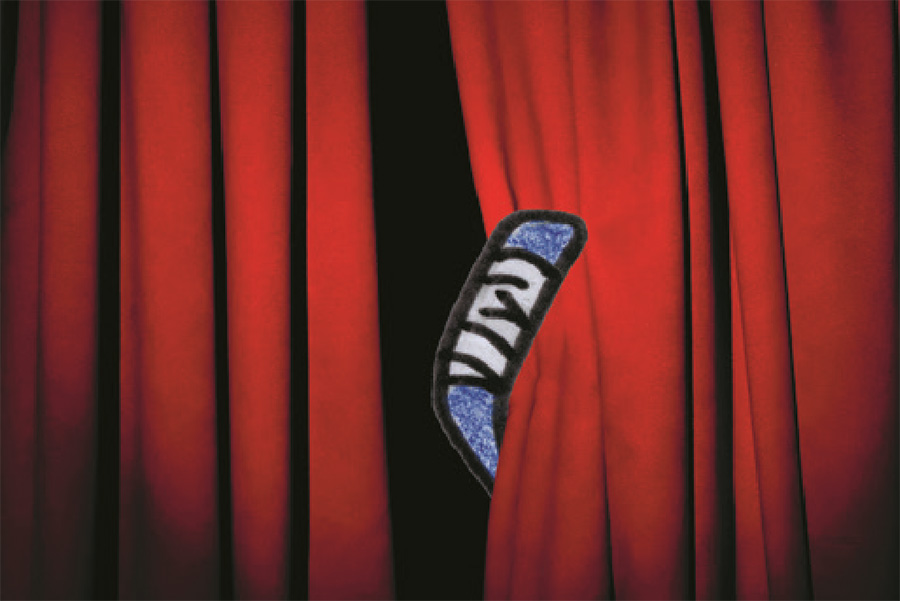
T he Orange and Blue always had a place in the office of Wayne Hasenbalg ’76. The traditional felted Gettysburg College pennant, photos, and other memorabilia have sparked conversations about his alma mater throughout his career. With pride in his voice, Hasenbalg took every opportunity to talk about his college experience.
“Gettysburg College completely changed my life,” Hasenbalg explained. “I grew up there, and in a way, I became the person I still am today completely based on my experience there—that’s something I have never forgotten, and it’s why I choose to pay it forward.”
That is also why, in the shadow of the Big Apple, from his former office at the Meadowlands, the retiree always took time to talk to Gettysburg College students calling for career advice.
“I always hoped that, at some level, I could provide somebody else with at least advice or steer them some way—whatever I could do to give them the ability to use their experience from Gettysburg in a way that got them in the door,” said Hasenbalg.
Hasenbalg’s career concluded with quite the swan song, bringing the Super Bowl and other world-class events to the Meadowlands as CEO of the New Jersey Sports and Exposition Authority. But he never forgets his roots, always honored to have the Orange and Blue by his side.
IGNITING CONNECTIONS ON CAMPUS
The genesis of many Gettysburgians’ careers in the sports industry can be traced back to childhood sports and the opportunity to compete at the collegiate level. With peers, faculty, staff, and alumni cheering them on, the Gettysburg Network endures, extending well beyond the playing fields and classrooms.
ESPN production and business operations supervisor Lindsay Hayden ’19, a former member of the Bullets swimming team, gained the confidence to “keep swimming” through life thanks to the knowledge and enduring skills she cultivated at Gettysburg. As she sets her sights on climbing the ladder at ESPN, she continually reflects on how she developed her strong work ethic racing against the clock in the pool and challenging herself in the classroom as an English major.
“Coach [Mike] Rawleigh once said swimming is about discovering yourself. I think back to that quote a lot,” said Hayden. “You’re always trying to push yourself, and that’s what makes the best people once you get into the workforce.”
While Charrisha Watkins ’13 picked up a tennis racquet at the age of 4 and continued playing on Gettysburg’s courts, she never thought she’d be working for the United States Tennis Association (USTA). It was through several key Gettysburg connections that her dream was set into motion.
Inspired and motivated by her mentor, Management Prof. Amy Hooper, Watkins attended a Center for Career Engagement (CCE) career fair, where she connected with Gettysburg College Alumni Board of Directors member Jack Duffy ’79, a vice president for AT&T. As Watkins’ network grew, she later completed AT&T’s rigorous training program and was hired as a sales representative, ultimately catapulting her toward the USTA.
“Because of Gettysburg and the AT&T program, having that sales background and competitive tennis background, merging the two was how I was able to land a job at USTA,” said Watkins, who now serves as a USTA community program representative for the Sacramento and Northern California region. “It goes back to Prof. Hooper—she saw something in me and believed in me.”
Watkins calls her return to the tennis world a “full-circle moment” that allows her to share the sport she loves with the next generation. But her career wouldn’t be possible without Gettysburg College, its holistic approach to education, and its expansive network.
“I appreciated the rigorous academic work at Gettysburg because I learned how to think critically. Critical thinking skills are so important, and sports give you a different kind of mindset, discipline, and grit to how you approach life,” Watkins said.
“[Gettysburgians] are taking the time to push you, challenge you, and support you in ways that I just don’t think you get at some bigger schools,” added Hayden.
BREAKING INTO A COMPETITIVE INDUSTRY
The professional sports industry, by its very nature, is highly competitive. The backbone of the big four leagues— Major League Baseball (MLB), National Basketball Association (NBA), National Football League (NFL), and the National Hockey League (NHL)—includes an intricate business model supporting the glitz, glamour, and grit exhibited by star athletes.
That makes connections all the more vital for those eyeing the leagues’ business careers, including connections in the vast Gettysburg Network of passionate thinkers and trailblazers across the globe.
Mike Luteran Jr. ’04, vice president of ticketing for the MLB, is extremely active within the Gettysburg Network. The former Bullets catcher frequently hosts externships and speaks on panels organized by the CCE. When current students or alumni call him—something that happens on a weekly basis—he’s happy to offer his insider’s insights. He often rattles off the names of several students he’s helped over the years, with whom he’s on a first-name basis.
“The alumni network is vast and strong, and I think people are always willing to give time,” Luteran said. “That’s a direct reflection of the kind of experience that people have at Gettysburg.”

As an advocate for the power of networking, something he wished he leveraged more as a student, Luteran credits Gettysburgians for being “proactive” in gaining the edge within a competitive job market. With a Career- Ready Experience guaranteed for every student participating in the Gettysburg Approach, Gettysburg graduates enter the workforce ready for every job they pursue. In fact, a recent survey of 200 employers said that Gettysburg graduates, across all industries, possess and outperform their peers in what employers define as must-have career skills, such as teamwork, communication, and leadership.
“The environment at Gettysburg instilled networking in me—the ability to spark conversations, interact with people, and take those chances,” said Luteran. “That’s why that part of my professional career came easy.”
“The environment at Gettysburg instilled networking in me—the ability to spark conversations, interact with people, and take those chances.”
–Mike Luteran Jr. ’04
Tapping into the Gettysburg Network is game-changing. For Sean Smith ’14, meeting Ed Tapscott P’14, vice president of player development for the Washington Wizards, at a CCE networking dinner his sophomore year led to a courtside job shadowing experience in Washington, D.C. It was during postgame conversations with Tapscott that Smith began to grasp the business model supporting professional sports and realized his potential for success in the industry.
“I knew I wanted to work in professional sports—that really was just the trigger,” Smith said.
Motivated by this Career-Ready Experience, Smith then completed two internships: one with the New York Islanders and another for Eric Handler ’86, vice president of communications with the YES Network. On the cusp of graduation, at another CCE networking dinner, Smith connected with Ray Hopkins ’87, who was transitioning from YES to CBS Sports at the time. Each of these connections paved the way for Smith’s first job after college with the Long Island Ducks, an MLB partner organization.
Acknowledging it can be challenging to break into the sports industry, Hayden enjoys talking to fellow alumni, sharing advice from “behind the curtain” on the importance of resilience, and encouraging Gettysburgians to be confident in their education and the power of the Gettysburg Network.
“Having Gettysburg on your resume is huge,” said Hayden. “A lot of people understand what it means to have gone to a liberal arts school. Gettysburg’s network is great—and I think that’s why we have so many excellent, high-level alumni throughout the business world—and that network is there to help you.”
When the COVID-19 pandemic shut down the sports industry, networking felt like a safety net for many, including Smith and Luteran. They were resources for each other, bouncing ideas off one another for support and guidance as businesses looked to reopen. Today, networking has become more critical than ever to connect and share information, or to simply share empathy, Smith said.
“I learned from someone early on in my career that you never know how helpful they might be to you down the road,” agreed Hasenbalg. “That advice has always stuck with me.”
PASSING THE TORCH
Members of the Gettysburg College community, inspired by those who came before them, are compelled to pay it forward. Helping the next generation of Gettysburgians is a win-win, sparking nostalgia for alumni while opening new doors for students.
After four promotions in the past decade, Smith now serves as the general manager for the Ducks and makes a concerted effort to give back to the Gettysburg Network in a way that emulates what Handler did for him: “I’ve really never come across anybody associated with the College who wasn’t willing to help by any means they could,” said Smith.
“I remember Sean Smith—he was a great intern,” said Handler. “A good number of my former interns have gotten either promotions or new jobs in the past six or eight months. When they reach out to let me know they have a new job and say, ‘Thank you for everything’—that really, really makes me proud. I get a genuine sense of satisfaction from hearing from Gettysburgians I’ve helped along the way, now making their own names in the real world.”
Jessiey Ken-Kwofie ’21, who was recently hired as an inside sales representative for the Boston Red Sox, often taps into her Bullets softball team’s tight-knit alumni network, as well as the Gettysburg Network’s “powerful” presence on LinkedIn. Since she was young, she always knew she wanted to connect with others through meaningful conversations and make a difference in their lives.
“Gettysburg’s network is great— and I think that’s why we have so many excellent, high-level alumni throughout the business world—and that network is there to help you.”
–Lindsay Hayden ’19
“I definitely want to give back and provide opportunities to students who might be interested in the sports industry moving forward,” said Ken-Kwofie. “There were countless times when alums came back to Gettysburg when I was still on campus and shared their experiences.”
Sparked through Gettysburg’s liberal arts and sciences education, these consequential connections within the Gettysburg Network speak volumes.

“People don’t forget the impact that other people have on them when somebody goes out of their way to help them, when there is no real gain to them—other than the desire to help someone who may remind them of a younger version of themselves. We all have those people in our lives,” said Luteran.
“Ultimately, if they do look back,” Luteran continued, “they’re going to realize that they probably wouldn’t have gotten to the place they would have as quickly or as easily without that person’s help—and they then want to pass that along. For Gettysburgians, that’s the power of the Gettysburg Network.”
by Karen Hendricks and Molly Pavlovich
Posted: 07/01/24